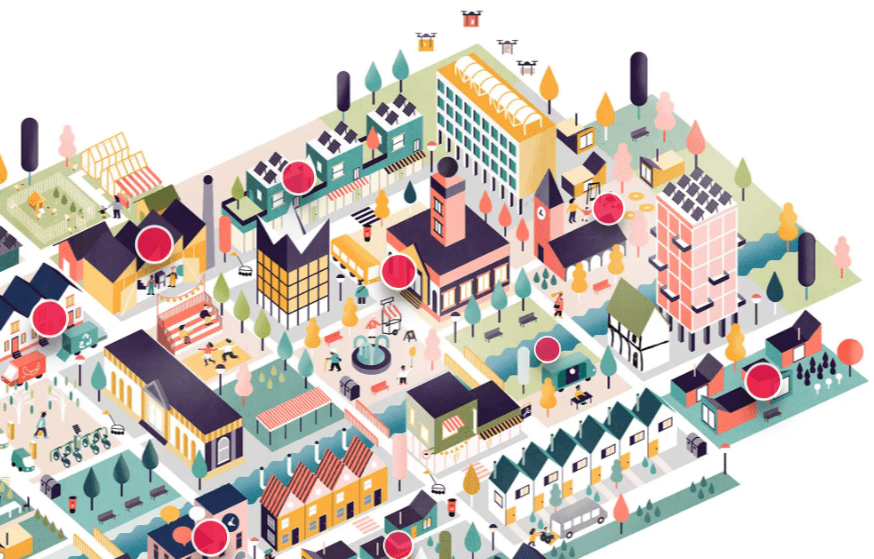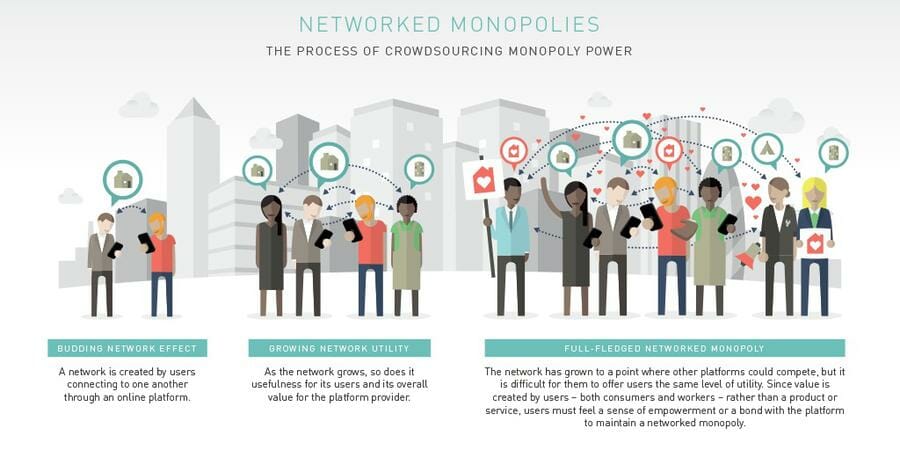
Ever wondered what a town built on principles of sharing and collaboration might look like? Nesta, the UK Agency for Innovation, has developed the answer – an “imaginary town created to explore a preferred future for the way citizens, technology and local government live and work together”.
Nesta’s ShareTown helps with understanding what such an economy, enabled by technology might be like. It considers how an economy built around shared interests, rather than around private business interests might work, and how such a town might look.
Nesta did not develop ShareTown as a “prediction” but rather to help set the direction of the possible journey towards a more positive destination – it is considered an inspiration rather than a set in stone model. The design of the town was created in May 2018.
Reviewing ShareTown, it is possible to see how local government, community organisations and citizens work together in a more cooperative and collaborative manner. For example, Zoe and Max are two citizens who are moving house, who are providing unwanted furniture to a community waste cooperative. Meanwhile, nursery care for a child is scheduled around actual hours of work for another citizen, Gwen. In return, Gwen volunteers at the childcare cooperative. There are social housing units, and mobile resource centres, that individuals and groups run to help one another out.

The change in emphasis compared with a town that is built on a foundation of business interests is significant and very noticeable. The interactions and interrelations between organisations and social benefit is noteworthy, and the system that ShareTown is run by is primarily digital and balanced. This is shown to lead to a local economy that can be prosperous, but that can also be much more balanced, so that everyone is supported, and everyone plays a part in providing support as well.
It is worth considering one concern with the ShareTown proposition, which is highlighted by Aaron Fernando of Shareable. This is the matter of the use of technology. As has been seen with cases of various large organisations and their ownership of platforms, this has led to dominance by a few large players, and the ability for digital platforms to be utilised by just a few people to manipulate a very large proportion of populations. Some call these bigplatforms, network monopolies, and look with expectancy and hope for blockchain alternatives, providing us with a fairer system.

These types of issues have been seen with interference in democracy via Facebook, in both the United States and the United Kingdom, and are a significant concern for many. There will be a need, if a town like ShareTown is to operate effectively, to avoid these types of challenges, and the level of control by just a few, and in particular by business interests. This needs some detailed degree of discussion, especially around the areas of control and
governance. Other models produced in the past have not focused so much on technology, and it is possible that these might offer a better way forward, all things considered – but there is room for more discussion.
In the meantime, Nesta’s ShareTown reviews the ways in which digital platforms can
indeed be leveraged to offer social impact. This is based around concepts of gathering data and tracking and monitoring it to help improve lives. One example provided of this is a mobile library within the town. This is funded both publicly and privately, it gathers data and it tracks the outcomes for its users. This at first glance seems admirable, but there is some discomfort in some quarters about the tracking of data and what that might involve – and indeed whether users would want this sort of data to be tracked and monitored.
Having reviewed Nesta’s ShareTown, it is by no means perfect – but then, it was not necessarily meant to be. Rather, it provokes ideas and discussion and inspires people towards building a better, more collaborative future within towns, where everyone works together towards the same vision and goals. In such a society, private interests become much more minimized, and greater social good is achieved. ShareTown is surely a step in the right direction in helping to consider what a better future might look like, and perhaps in starting to get policymakers talking about possibilities and potential – and that can only be good news for citizens and society as a whole.

Paula Newton is a business writer, editor and management consultant with extensive experience writing and consulting for both start-ups and long established companies. She has ten years management and leadership experience gained at BSkyB in London and Viva Travel Guides in Quito, Ecuador, giving her a depth of insight into innovation in international business. With an MBA from the University of Hull and many years of experience running her own business consultancy, Paula’s background allows her to connect with a diverse range of clients, including cutting edge technology and web-based start-ups but also multinationals in need of assistance. Paula has played a defining role in shaping organizational strategy for a wide range of different organizations, including for-profit, NGOs and charities. Paula has also served on the Board of Directors for the South American Explorers Club in Quito, Ecuador.


























